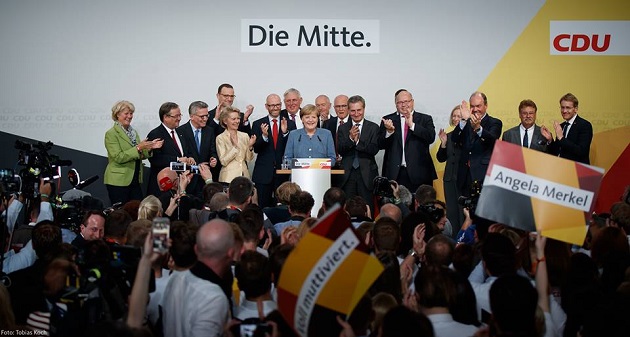Angela Merkel wins but far-right populists become third force in Germany
Coalition talks will be “tough”, the Chancellor admits. Concerns in Europe as AfD’s anti-migration party gets 94 seats in the Federal parliament.
BERLIN · 25 SEPTEMBER 2017 · 10:00 CET

Germany voted on Sunday to give Chancellor Angeda Merkel a fourth term, but she will struggle to form government coalition.
With 33% of the vote, Merkel had asked voters to support her as a “the centre” option that could combat extremes. Her party CDU lost 55 seats, but she still is the main force in the “Bundestag” (the Federal parliament), with 246.
“We had hoped for a better result”, the chancellor said in Berlin, and “tough weeks are ahead” to form a coalition, which she hopes will be ready before Christmas. Analysts believe the clearest option is to add the Liberals of FDP (who entered parliament with 10% and 80 seats) and the Greens (9% and 67 seats).
The Social Democrats of SPD suffered a big loss (20% and 153 seats) in what their candidate and former President of the European Parliament, Martin Schulz, described as “a bitter hour” for his party.
AFD: FAR-RIGHT BECOMES THIRD FORCE
The big “winners of the night” and the centre of all discussions the day after the election are Alternative for Germany (AfD). Previous surveys showed their growing support base, but now their 94 seats and 12% of support will have be taken seriously.
Their success sparked spontaneous protests in Berlin and other cities, with people chanting: “Nazis out!” But protests will not be enough, and practical answers will need to be put on the table to change the minds of a growing sector of society (mainly men) who support their nationalist populistic anti-refugee ideas.
CHRISTIANS HAVE TO OFFER SOLUTIONS
Christians had called to strengthen “relationships” to build the future of the country. “We pray for Germany and everyone voted into positions of responsibility immediately after the election - for wisdom, courage, and integrity in their leadership”, the Evangelical Alliance said.
The arrival of hundreds of thousands of asylum seekers and migrants since 2015 revealed a deeper question of identity”, Christian journalist Nicolai Franz analysed in an interview with Evangelical Focus.
“Since the refugee crisis many German evangelicals have rediscovered the social concerns and humanitarian engagement of their grandfathers – not only by evangelizing refugees from mainly Muslim countries but also by charity. But there are also evangelicals that consider Merkel’s refugee policy a serious mistake that will change Germany forever”, he explained.
But “evangelicals have the chance to help re-formulate basic principles of how we can live together peacefully”.
You can find more recent news about Germany here.
Published in: Evangelical Focus - europe - Angela Merkel wins but far-right populists become third force in Germany
